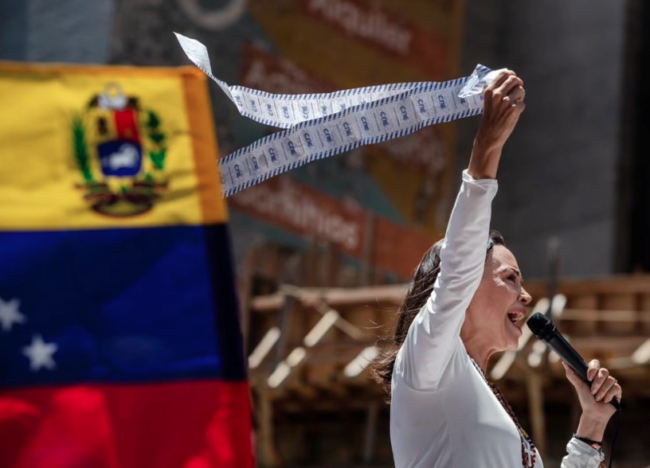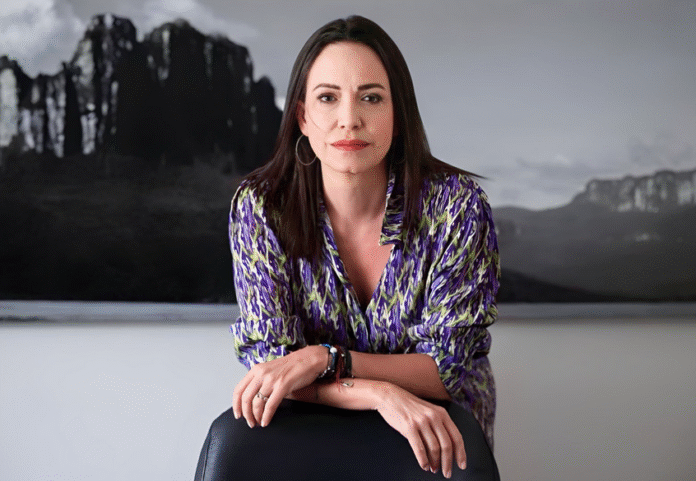Venezuelan opposition leader Maria Corina Machado has been awarded the 2025 Nobel Peace Prize, the Norwegian Nobel Committee announced on Friday, recognizing her “tireless work promoting democratic rights for the people of Venezuela” and her “struggle to achieve a just and peaceful transition from dictatorship to democracy.”
Machado, 58, is the first Venezuelan to receive the prestigious award. The Committee praised her as a “key, unifying figure” in the once deeply divided opposition to President Nicolás Maduro’s government, and as someone who “keeps the flame of democracy burning amid a growing darkness.”
“In the past year, Ms. Machado has been forced to live in hiding,” said Jørgen Watne Frydnes, chair of the Norwegian Nobel Committee. “Despite serious threats against her life, she has remained in the country, a choice that has inspired millions. When authoritarians seize power, it is crucial to recognize courageous defenders of freedom who rise and resist.”
For more than two decades, Machado has been a central figure in Venezuela’s pro-democracy struggle. Her movements have always been grass-roots, people-led organizations devoted to electoral transparency. One of her slogans “ballots over bullets” has marked a political career in defense of judicial independence, human rights, and representative government.
As the space for political dissent narrows under Maduro, Venezuela is now a country defined by repression and economic collapse. Most Venezuelans live in deep poverty, while the state’s security forces target political opponents and ordinary citizens alike. According to U.N. figures, nearly 8 million Venezuelans have fled the country in recent years.
Ahead of the 2024 presidential election, Machado emerged as the leading opposition candidate, galvanizing popular support across party lines. But the National Election Council barred her from running, forcing her to endorse Edmundo González Urrutia, a former diplomat representing a broad coalition of opposition parties.
In the months leading up to the July 28 vote, hundreds of thousands of citizens volunteered as election observers, determined to ensure transparency. Despite the risks of harassment, arrest, and torture, they documented vote tallies at polling stations across the country before authorities could tamper with ballots.
When the opposition published the verified vote lists, they showed that González had won by an overwhelming majority. But Maduro refused to recognize defeat, galvanizing his grip on power. González was forced into exile, while Machado went underground, continuing to coordinate opposition activities from hiding.
A Nobel Prize with Geopolitical Weight
The Nobel Committee’s decision carries symbolic weight far beyond Venezuela. It highlights the global trend of democratic backsliding and growing authoritarianism, underscoring that “democracy is a precondition for lasting peace,” as the Committee noted in its statement.
The Maduro regime, more than a year after the rigged election results, remains in power. Its survival depends largely on the loyalty of the senior members of the Boliviarian Armed Forces with close ties to the so-called drug cartel “Cartel de los Soles”. While the dictator still counts on key international allies such as Iran, China and Russia, support from them is eroding given the threat of economic reprisals from the Trump administration. In recent weeks, President Donald Trump ordered a major naval buildup off Venezuela’s Caribbean coast, aimed at isolating the regime and disrupting drug trafficking networks that use fast boats to move narcotics north.
Machado reacted to the Nobel announcement on X, calling the award “an impetus to conclude our task: to conquer freedom.” She added: “We are on the threshold of victory and today more than ever we count on President Trump, the people of the United States, the peoples of Latin America, and the democratic nations of the world as our main allies to achieve freedom and democracy.”
Machado has earned the nickname “Venezuela’s Iron Lady” for her unrelenting stance against arbitrary detentions, election rigging, and the militarization of society. Over the past year, she has operated largely from safe houses, evading capture while continuing to address supporters through encrypted channels and clandestine meetings.
Her award places her in the company of past Nobel Peace laureates who stood up to authoritarianism through peaceful means. “Democracy depends on people who refuse to stay silent, who dare to step forward despite grave risk, and who remind us that freedom must never be taken for granted,” the Nobel Committee stated.
The announcement has immediate reverberations across Latin America, where debates about democracy, authoritarianism, and civic resistance have intensified. Venezuela’s crisis has reshaped migration patterns and Bogotá is home to one of the largest communities of Venezuelan exiles, an estimated 800,000.
Machado’s recognition not only unites the Venezuelan diaspora behind a common cause and further delegitimizes an illegitimate regime, one, sadly, with close ideological ties to Colombia’s Gustavo Petro.
The former M-19 guerrilla has refused to acknowledge the opposition’s 2024 electoral victory with the González–Maduro ticket and reacted to the Nobel announcement with a muted message. “I congratulate Wangari (Maathai) and María Corina (Machado) for their Nobel prizes. Wangari has fought to defend life on the planet in the face of the climate crisis. From María Corina, I hope that she helps her country achieve dialogue to maintain peace,” Petro wrote. By intentionally mentioning Machado second, and framing his remarks around “dialogue” rather than a peaceful democratic transition, Petro, yet again, shows his emotional contempt, political disdain for the Laureate, and allegiance to autocracy.


